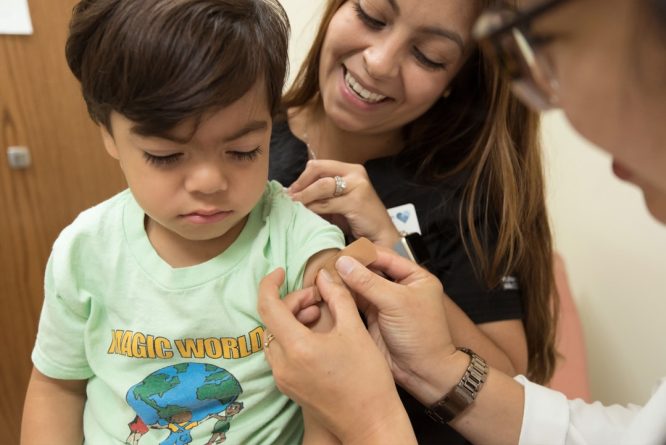Measles cases in Texas have skyrocketed to nearly 600 in just three months, and the numbers keep climbing. Fueled by declining vaccination rates, cases have surged across the state and surrounding areas.
Highly contagious and dangerous for the unvaccinated, measles can lead to severe complications, especially in children. As of mid-April 2025, out of the nearly 600 affected, 62 patients were hospitalized. Two of them, both children, died from measles.
The good news? Prevention is possible. Learn more about this alarming outbreak, why it’s spreading, and how to keep yourself and your family safe.
Overview of Measles
Measles is a highly contagious virus and respiratory illness that can be life-threatening to anyone who isn’t protected. The airborne virus spreads through droplets when an infected person breathes, sneezes, or coughs.
Complications can include pneumonia, encephalitis (brain swelling), and premature birth in pregnant women. In severe cases, measles can be fatal.
The disease was considered eliminated from the U.S. since 2000, thanks to the measles vaccine. However, since then, declining rates of vaccinations have led to outbreaks.
What’s Happening With the Current Measles Outbreak in Texas?
The Texas Department of State Health Services has reported an outbreak of measles across the state, but primarily affecting West Texas. At this time, 597 cases have been confirmed since late January.
The nearly 600 affected span across 25 counties, most in West Texas. Sixty-two percent of cases are in Gaines County, where the virus has been spreading quickly through the under-vaccinated community.
State health officials estimate that about 4% of cases, or fewer than 30, are actively infectious. However, due to the contagious nature of measles, experts predict more cases will occur in the outbreak area and its surrounding communities.
As of today, 62 patients have been hospitalized throughout the outbreak. There are two known fatalities — both school-aged children who lived in the outbreak area, with no measles vaccination or underlying conditions.
What Are the Common Symptoms of Measles?
Early signs of measles in the first few days include a sore throat, runny nose, cough, moderate fever, and red eyes. After a few days, a blotchy rash breaks out, spreading down the neck to the rest of the body with flat, red or brown spots. You may also notice what are called Koplik spots, or blue-white spots that appear inside the mouth.
At this point, the fever may increase to a high fever, even as high as 104 degrees. It’s important to stay home during this period, as an infected person is contagious about four days before the rash appears and remains contagious until about four days after.
With increased fluid intake, plenty of rest, and over-the-counter medications like acetaminophen for fever, most common symptoms will disappear within two to three weeks. However, some people may develop more serious complications that require emergency medical attention.
How To Prevent and Avoid More Measles Cases in Texas?
Despite the seriousness of the Texas measles outbreak, it’s important to know that measles is easily preventable. You have the power to protect yourself and your children by getting vaccinated with the measles-mumps-rubella vaccine, or MMR.
According to the Centers for Disease Control (CDC), each person should be immunized with two doses of a measles-containing vaccine, including MMR. One dose is 93% effective at preventing measles, but two doses are 97% effective.
For children, the CDC recommends they receive one dose of MMR at 12 to 15 months of age and another at four to six years of age. However, parents may request a second dose earlier if at least 28 days have passed since the first dose.
Early dosing at six to 11 months of age is allowed for exceptions like international travel, after exposure to measles, or nearby outbreaks declared by the local health department.
Children younger than 12 months and other unvaccinated individuals, as well as anyone with underlying issues or an immunocompromising condition, are the most at risk of a measles outbreak. In these cases, you should avoid large crowds if possible, avoid contact with anyone who is sick, and delay travel to an area experiencing an outbreak.
Potential Future Implications
What began in Texas has now become a multi-state crisis, with active outbreaks emerging in other states like Oklahoma, Ohio, New Mexico, Kansas, Indiana, and Michigan. Overall, the U.S. has more than double the number of measles cases so far this year than in all of 2024.
Each new case increases the likelihood of sustained transmission, particularly in under-vaccinated communities. With more hospitalizations — and possibly deaths — on the horizon, 2025 is shaping up to be one of the worst measles years in decades.
The rise in cases highlights how quickly measles can spread, especially when it’s undetected. Early testing is critical to containing outbreaks and protecting those at highest risk.
At Next Level Urgent Care, we make it simple to safeguard your family. Our clinics offer easy-access MMR testing and expert care if you suspect exposure.
Don’t leave your health and your children’s health up to chance. If you think you may have been exposed or are displaying symptoms, schedule your appointment today to get tested. You can also walk in anytime between 9:00 AM and 9:00 PM — we’re here to help.
![NL Wordmark [Gradient] NL Wordmark [Gradient]](https://www.nextlevelurgentcare.com/wp-content/uploads/elementor/thumbs/NL-Wordmark-Gradient-7fm1iv6f0zylwqrxpy8kifrnrzsluqzzzofvqvs6smo.png)
